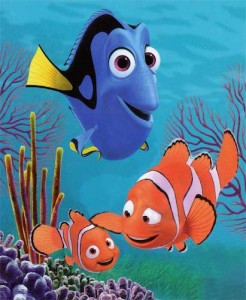English is a complex language, as many of its non-native speakers are well aware. Among the several confusing aspects of its grammar is the issue of plural forms. While those who grew up speaking English tend to take them for granted, I know several people still learning the language who find it odd that “houses” can be infested with “mice” or that North America has “moose” and “geese”. Most unusual plural forms are common knowledge to us, but even native English speakers can be thrown off by some lesser known plural forms.
Just for fun, here are three plural forms that are uncommonly known to be correct. Enjoy, and be careful not to get them wrong!
1) Fishes

There are three fish in this picture, but only two fishes! (Finding Nemo, 2003)
This may be my favorite uncommon plural word because it’s one I see all the time in my field of study. As a Marine Biology student, I’m constantly reading papers and book chapters containing the keyword “fishes”, and I’d be lying if I said I didn’t feel smart for knowing why this plural form of “fish” is correct.
We were taught as children that the plural of “fish” is the same as its singular form, while fewer of us have been exposed to its other plural form in scientific contexts. But here’s the catch (no pun intended): “fishes” is used to indicate multiple kinds of fish (as in “Fishes of the Caribbean”), while “fish” is used to indicate multiple individual fish (note that “fishes” was once used in this sense too, but has since fallen into disuse).
So yes, you’ll probably still be using “fish” most of the time, but at least you now know why the famous phrase “sleeping with the fishes” isn’t entirely wrong!
2) Octopuses
I bet you’ve gone most of your life thinking that the plural form of “octopus” is “octopi”. Don’t worry; so have I. When I was a kid, I had a Math book titled “How Do Octopi Eat Pizza Pie?”, and ever since, I’d been walking around thinking more than one “octopus” should be called “octopi”. Turns out, until last month, I’d thought wrong.
Similar to the previous example, we were taught at a young age to follow a specific rule when creating the plural form of certain words, but without really understanding why. We just know that several words ending in -us are pluralized by replacing the last two letters with -i. However, this mostly applies to some words derived from Latin, such as “cactus” (which, despite being Greek in origin, counts as an example of botanical Latin). “Octopus”, on the other hand, is etymologically Greek, and thus does not obey this rule. This is why “cacti” is correct (though “cactuses” is also acceptable), while “octopi” is not. Instead, pluralize “octopus” as “octopuses” or “octopodes”, and if anyone ever tries to correct you, you’ll know how to explain why your way is correct!
3) Dwarfs
Fans of The Lord of the Rings and other fantasy stories by J.R.R. Tolkien may be overly familiar with the word “dwarves”. What many may not realize, though, is that this is actually a newer plural form of “dwarf” that was popularized by the author (though it seems to have originated elsewhere). The standard plural form is actually “dwarfs”, and is the correct spelling for most contexts. However, “dwarves” seems to have become increasingly acceptable in fantasy fiction to indicate multiple individuals of a race of little people, so it shouldn’t be disregarded completely. The important thing is to know the difference, especially if you write a lot in the fantasy genre. Whether you’re referring to “Snow White and the Seven Dwarfs” or the “elves” and “dwarves” of Middle-earth, make sure you know when to use which form!
What are your thoughts on these unusual plural forms? Any more you would add to this list?


Trackbacks/Pingbacks